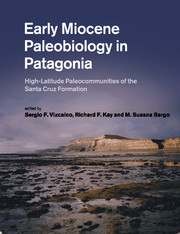Book contents
- Early Miocene Paleobiology in Patagonia
- Frontispiece
- Early Miocene Paleobiology in Patagonia
- Copyright page
- Contents
- Contributors
- Preface
- 1 Background for a paleoecological study of the Santa Cruz Formation (late Early Miocene) on the Atlantic Coast of Patagonia
- 2 Tephrochronology of the Miocene Santa Cruz and Pinturas Formations, Argentina
- 3 Absolute and relative ages of fossil localities in the Santa Cruz and Pinturas Formations
- 4 Sedimentology and paleoenvironment of the Santa Cruz Formation
- 5 Oysters from the base of the Santa Cruz Formation (late Early Miocene) of Patagonia
- 6 Ichnology of distal overbank deposits of the Santa Cruz Formation (late Early Miocene): paleohydrologic and paleoclimatic significance
- 7 Fossil plant studies from late Early Miocene of the Santa Cruz Formation: paleoecology and paleoclimatology at the passive margin of Patagonia, Argentina
- 8 Amphibians and squamate reptiles from the Santa Cruz Formation (late Early Miocene), Santa Cruz Province, Argentina: paleoenvironmental and paleobiological considerations
- 9 Diversity and paleobiology of the Santacrucian birds
- 10 Paleoecology of the Paucituberculata and Microbiotheria (Mammalia, Marsupialia) from the late Early Miocene of Patagonia
- 11 Paleoecology of the mammalian carnivores (Metatheria, Sparassodonta) of the Santa Cruz Formation (late Early Miocene)
- 12 Paleobiology of Santacrucian glyptodonts and armadillos (Xenarthra, Cingulata)
- 13 Paleobiology of the Santacrucian sloths and anteaters (Xenarthra, Pilosa)
- 14 Paleobiology of Santacrucian native ungulates (Meridiungulata: Astrapotheria, Litopterna and Notoungulata)
- 15 Paleobiology of Santacrucian caviomorph rodents: a morphofunctional approach
- 16 Paleobiology of Santacrucian primates
- 17 A review of the paleoenvironment and paleoecology of the Miocene Santa Cruz Formation
- Index
10 - Paleoecology of the Paucituberculata and Microbiotheria (Mammalia, Marsupialia) from the late Early Miocene of Patagonia
Published online by Cambridge University Press: 05 June 2013
- Early Miocene Paleobiology in Patagonia
- Frontispiece
- Early Miocene Paleobiology in Patagonia
- Copyright page
- Contents
- Contributors
- Preface
- 1 Background for a paleoecological study of the Santa Cruz Formation (late Early Miocene) on the Atlantic Coast of Patagonia
- 2 Tephrochronology of the Miocene Santa Cruz and Pinturas Formations, Argentina
- 3 Absolute and relative ages of fossil localities in the Santa Cruz and Pinturas Formations
- 4 Sedimentology and paleoenvironment of the Santa Cruz Formation
- 5 Oysters from the base of the Santa Cruz Formation (late Early Miocene) of Patagonia
- 6 Ichnology of distal overbank deposits of the Santa Cruz Formation (late Early Miocene): paleohydrologic and paleoclimatic significance
- 7 Fossil plant studies from late Early Miocene of the Santa Cruz Formation: paleoecology and paleoclimatology at the passive margin of Patagonia, Argentina
- 8 Amphibians and squamate reptiles from the Santa Cruz Formation (late Early Miocene), Santa Cruz Province, Argentina: paleoenvironmental and paleobiological considerations
- 9 Diversity and paleobiology of the Santacrucian birds
- 10 Paleoecology of the Paucituberculata and Microbiotheria (Mammalia, Marsupialia) from the late Early Miocene of Patagonia
- 11 Paleoecology of the mammalian carnivores (Metatheria, Sparassodonta) of the Santa Cruz Formation (late Early Miocene)
- 12 Paleobiology of Santacrucian glyptodonts and armadillos (Xenarthra, Cingulata)
- 13 Paleobiology of the Santacrucian sloths and anteaters (Xenarthra, Pilosa)
- 14 Paleobiology of Santacrucian native ungulates (Meridiungulata: Astrapotheria, Litopterna and Notoungulata)
- 15 Paleobiology of Santacrucian caviomorph rodents: a morphofunctional approach
- 16 Paleobiology of Santacrucian primates
- 17 A review of the paleoenvironment and paleoecology of the Miocene Santa Cruz Formation
- Index
Summary
This chapter presents a paleoecological analysis of non-carnivorous Santacrucian marsupials of the orders Paucituberculata and Microbiotheria. Different ecological niches are inferred from estimates of body mass, diet, and locomotor behavior. Body masses were estimated using a regression analysis based on living marsupials. Possible dietary preferences were explored by an analysis of the development of molar shearing crests. Inferences about locomotor behaviors of some species with well-preserved postcranial skeletal remains were derived from a published morphofunctional analysis. From the wide range of estimated body masses and diet several niches were inferred: small- to medium-sized insectivores, small- to medium-sized insectivore–frugivores, and medium- to large-sized frugivores. According to our results, Paucituberculata and Microbiotheria of the Santa Cruz Formation constitute an ecologically diverse assemblage that inhabited forested habitats, developed under warm temperatures and seasonal rainfall. These forested habitats could have supported several non-carnivorous marsupial niches, offering diverse resources both in the spatial dimensions and in the trophic ones.
- Type
- Chapter
- Information
- Early Miocene Paleobiology in PatagoniaHigh-Latitude Paleocommunities of the Santa Cruz Formation, pp. 156 - 172Publisher: Cambridge University PressPrint publication year: 2012
- 12
- Cited by



